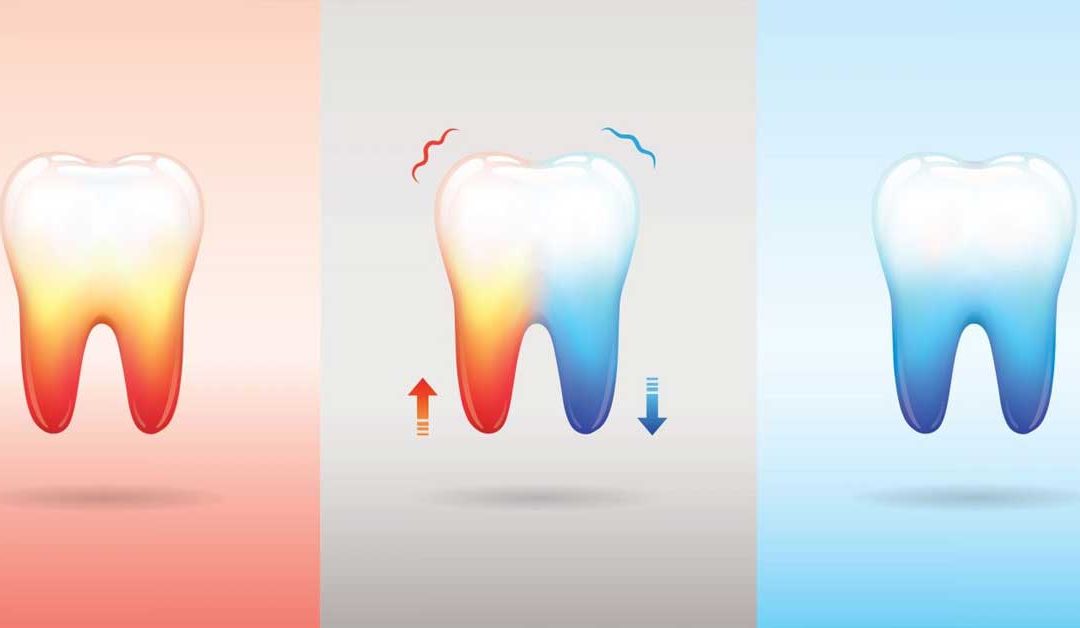Are You Getting Zinged by Hot or Cold? You Could Have Tooth Sensitivity

What is Tooth Sensitivity?
Tooth sensitivity is something that most people experience at some point or another and although a common problem, it can be quite a hindrance in your daily life. Tooth sensitivity or dentin hypersensitivity can be caused by several different factors, and may come and go over time. Typically the most common symptom of sensitive teeth is a sharp pain when consuming products that are hot, cold, acidic, or particularly sweet. While this might began as a slight nuisance, this sudden sensitivity may likely worsen as time goes on. Therefore, we highly recommend scheduling an appointment with your dentist, before this minor problem becomes a major one.
Causes for sensitive teeth and how we can help!
While there are many factors that can put wear and tear on your teeth and ultimately cause tooth sensitivity, there are typically four main culprits behind this issue.
- Clenching/Grinding: Clenching and grinding your teeth (or bruxism) might be a side effect of excess stress, excess frustration, malocclusion (jaw misalignment), or perhaps even a reaction to certain medications or stimulants. In addition to the onset of heightened tooth sensitivity, many patients also report facial pain or frequent headaches accompanying bruxism, thus causing additional discomfort. While making key dietary and lifestyle changes may help alleviate these symptoms, your dentist may also suggest a bruxism appliance or mouth guard. This is a custom fitted device created by your dentist, that provides your jaw with the necessary spacing and cushioning between and around your teeth. These devices can be worn during the day and at night, thus protecting your teeth from acquiring any excess wear.
- Fractured Tooth: Sometimes known as “cracked tooth syndrome” small cracks or abrasions on your tooth, although difficult to see sometimes, can cause a significant amount of pain and sensitivity in the affected tooth. Treating a fractured tooth typically varies depending on the size and positioning of the damaged area. The treatments can range from bonding, crowns, or in more serious cases a root canal. Although this may seem excessive for an epically small fracture, it’s important to realize that these cracks will likely grow in time. Therefore a proactive step would be to address the issue now instead of later. Learn how Dental Crowns are used in Restorative and Cosmetic Dentistry and Why Root Canal Therapy is Needed.
- Tooth Decay: Simply put, tooth decay is the breakdown of the tooth’s enamel and dentin, due to overexposure to acidic bacteria. While this basic dental issue may seem like an obvious problem, it remains persistent and easy to overlook issue for many. If detected early, your dentist may apply a sealant solution to protect and fill in the groves of your tooth. However if the enamel has been considerably destroyed, a filling will be needed.
- Gum Recession: Although periodontal or gum disease is a common issue that can affect people from all walks of life, how you choose to react to such an occurrence often determines how it may affect you individually. Gum disease is a gradual problem that occurs slowly over an extended period, and may initially present itself as inflammation and redness of the gum line. While this may not seem serous at first, the irritated gums may begin bleeding while growing increasingly sensitive to certain food products. This sensitivity is due to the root surface of the tooth becoming exposed resulting in a dental abfraction. To combat this, your dentist may recommend desensitizing toothpaste or gels, as well as using a softened toothbrush to prevent further trauma. Obviously continuing to practice proper oral hygiene under the supervision of your dentist may be the best solution for this issue as consistently ensuring your gum’s health is ultimately your best option. Learn about the Health Risks of Gum Disease and how you can Prevent Gum Disease.
Learn more about Dental Emergencies and When You Need a Same Day Emergency Appointment.
Schedule your appointment today!
As you can see, there are many ways in which we can help our patients with painful tooth sensitivity; however you should certainly come see us to receive a formal diagnosis. By letting us help you, you are taking a necessary first step in getting to the root of the problem!
We can provide a thorough exam to assess the health of your smile. At Thomas L. Anderson and Associates, we can help to ensure you maintain a lifetime of healthy smiles. We proudly offer our services to the Kansas City Metro and surrounding areas. Contact us today at one of our three convenient locations to schedule your dental appointment or to learn more about our other services.
Contact us today to schedule your dental appointment and meet with our skilled dentists at one of our three conveniently located dental office locations within the Kansas City area, including Lee’s Summit / Independence, the Country Club Plaza and Downtown Kansas City. The gentle dentists and expert team at Thomas L. Anderson and Associates look forward to working with you to treat your dental emergency, achieve proper oral health and a beautiful smile that will last a lifetime. If you have any questions about your dental insurance benefits, please do not hesitate to contact us. We are happy to review your policy! Please give us a call today to schedule an appointment and become part of our dental family.
